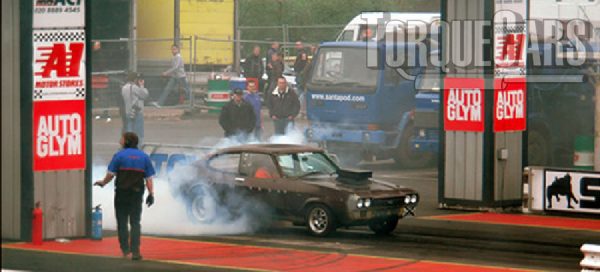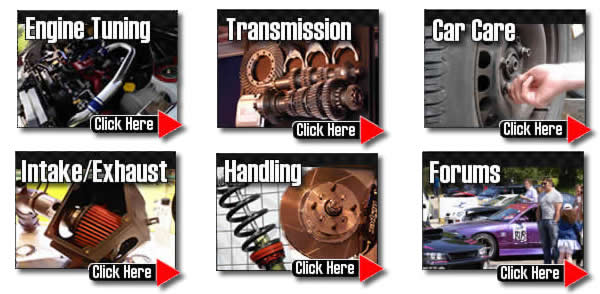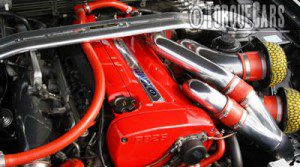Essential Mods for a 10 Second Car
"The 10 Second Target"
If you've watched any drag racing or street racing movies then you'll have heard about 10 second cars.
A 10 second car is a car that can do a quarter mile drag race in 10.9 seconds or less. This is the goal that many set out to achieve when modifying their car and has become a gold standard benchmark.
Although professional drag racing cars can do the quarter mile in less than half that time, 10 seconds remains a reasonable goal for serious car tuners. Having a 10 second car puts you in a rather exclusive set of road legal cars.
First up some commonly asked questions about 10 second cars.
- How fast is a 10 second car? Simply put, it is any car that can do a quarter mile run in under 11 seconds. If the time is 10.9999999 or better it counts as a 10 second car.
- Is a 10 second street car fast? Yes, most street cars would struggle to get near this, only around 1% of street cars will be able to do a 10 second run.
- What does it take to build a 10 second car? This needs a more detailed explanation, which we'll go into later, but simply put, you need around 400hp for every 1000kgs of your cars weight. Bear in mind that weight and traction also come into it, so it's not simply a matter of double both figures.
- What is the power to weight ratio for a 10 second car? 450bhp per ton is a good rule of thumb, a 1500kg car needs around 683 hp to do a 10.99 second run. See the table below for more indepth stats on power to weight ratios, less weight means less wasted power.
Find out what it takes to build a 10 second car.

What does it take to make a 10 second car? Your skill as a driver will influence your time.
Changing gear swiftly and at the optimum point in the power band will have a big effect.
For now, let's focus on the basic tuning requirements to get your car in with a fighting chance of hitting the 10 second goal.
You will likely want to increase your power output, but the smart money goes on increasing the power to weight ratio. A lighter car need less power to reach the magic 10 second goal.
Bearing in mind that a car has to overcome it's inertia explains why two cars with the same power to weight ratio will have shorter quarter mile times when the weight is lower.
Having some weight over the driven wheels can improve traction. Also adding aerodynamic downforce via a wing will improve traction but will often cost you a little extra drag.
So stripping out unnecessary weight combined with power tweaks will give you more bang for your buck.
What power to weight for a 10 second car?
There are a few assumptions made and each of these will have a bearing on the results to a larger or lesser degree.
Instead of just adding power, it makes sense to look at weight reduction, and this two fold approach is used by most serious drag racers when building a 10 second car.
If you take this as a general guide, it should point you in the right direction and help you to set and achieve a reasonable power goal.
Due to the varying nature of transmission losses results in our calculator will vary - we are working from flywheel horsepower in our calculator. Transmission losses are typically around 16% to 25% so we are working on an weighted average for each power band.
We are also assuming street spec tyres, super grippy drag tyres will dramatically improve your quarter mile time!
Please also note that traction is also a big issue so we have assumed higher power figures are RWD/AWD only, an 800bhp FWD car is going to have such large traction issues it will barely move at first.
Table showing 10 second quarter mile times (under 11 seconds) from weight and power.
| Weight KG | Power HP | Quarter Mile Time |
| 800 | 320 | 10.99 |
| 900 | 360 | 10.99 |
| 1000 | 400 | 10.99 |
| 1100 | 501 | 10.99 |
| 1200 | 547 | 10.99 |
| 1300 | 593 | 10.99 |
| 1400 | 638 | 10.99 |
| 1500 | 683 | 10.99 |
| 1600 | 730 | 10.99 |
| 1700 | 775 | 10.99 |
| 1800 | 820 | 10.99 |
| 1900 | 865 | 10.99 |
The above is a good rule of thumb, and adding more power and saving weight are the two methods used to achieve a 10 second car.
These figures are theoretical best times, weather conditions, tire condition and transmission type will all have a bearing on the results.
So we would aim for 10% more power than indicated to give you a good margin for your 10 second car.
For a 10 second car we recommend the following ratio as a good starting point :-
- 450bhp per 1000kg - bear in mind that lower weight cars make better use of the available power.
- So for a relatively heavy car of around 1600kg, such as a Supra or GT-R, you would need to aim for 740 bhp at the flywheel.
- While for a lightweight option, such as an 800kg Lotus 2-Eleven, you would only need around 320 bhp at the flywheel.

What about when we use a more sophisticated model?
So let's take a look and use a fairly sophisticated simulator where we get to play with a lot more variables and actually get an ET speed as well.
Now we have a baseline it's time for some more complex calculations. We ran some figures through more sophisticated and complex simulation software, drank lots of coffee and came back a week later to read the results. (It didn't take a week to calculate, but we were distracted by nice shiny cars and engines!)
So using Car weight at 1200kg and assuming its a RWD model as starting points we fed the following into our simulator.
Assumptions made in this next example calculation are:
- 50/50 weight distribution
- 245mm wide rear tyres
- 25 sq foot frontal area
- Drag coefficient of .36
- 5" ground clearance
- Gear ratios of 1.908, 1.525, 1.282, 1.085, 0.922, 0.786
- Final drive 3.85
- Max BHP at 6250 with gearchange at 6500
- Max lb/ft at 5200
- Redline 7500
- Turbocharged
- Runs at 300ft altitude (Santa Pod in the UK) under English weather conditions (dry but humid - yes we know it usually rains but we're trying to bring in the tourists!)
For a sub 10 second, 1/4 mile run for this car you will need around 750bhp and 650ft/lbs (ET 10.98 at 137mph). For a lighter car the power figure is lower but for a heavier car the power requirement goes up. Trim the weight by around 240lbs and you'll be hitting a 10.48 second 140mph time.
Breaking the 10 second barrier in this car will need around 1100bhp and 1000lb/ft of power - so quite a big hike.
Weight reduction is usually the cheapest and best option.
Increasing the power is a secondary consideration. Remember, grip, transmission, clutch and handling all play their part.
In terms of tuning we would suggest an engine swap, adding forced induction, head work and lowering the compression ratio, balancing & blueprinting, cryo treating the block as well as fitting fast road cams and uprating your fuelling.
Putting the power down is another factor and you can't beat some nice sticky drag spec tyres to do this.
All wheel drive cars are very good at getting the power down on the drag strip and we have seen significant amounts of time shaved off the quarter mile time with adjusted gear ratios, and traction control improvements

Production made 10 second cars
Instead of building a ten second car are there any off the shelf models which can turn in this time?
Here are ten models of factory-produced cars that can achieve a quarter-mile time under 11 seconds:
- Dodge Challenger SRT Hellcat Redeye
- Ford Mustang Shelby GT500
- Tesla Model S Plaid
- Chevrolet Camaro ZL1
- Dodge Charger SRT Hellcat
- Porsche 911 Turbo S
- Lamborghini Huracan Performante
- Nissan GT-R Nismo
- McLaren 720S
- Audi RS7 Sportback
I'm sure there are many others so please let me know in the comments if you know of a factory standard 10 second car and I'll add it to this list.
Our forum is a great place to chat with our resident petrol heads and drag racers to get some pointers on how to turn your car into a 10 second car.
Please Check out my YouTube channel, we're regularly adding new content...
PLEASE HELP: I NEED YOUR DONATIONS TO COVER THE COSTS OF RUNNING THIS SITE AND KEEP IT RUNNING. I do not charge you to access this website and it saves most TorqueCars readers $100's each year - but we are NON PROFIT and not even covering our costs. To keep us running PLEASE Donate here
If you liked this page please share it with your friends, drop a link to it in your favourite forum or use the bookmarking options to save it to your social media profile.
Feedback - What do You Think?
Please use our forums if you wish to ask a tuning question, and please note we do not sell parts or services, we are just an online magazine.
Help us improve, leave a suggestion or tip
Please watch this video and subscribe to my YouTube channel.
7 Responses to “Building a 10 second car”


 Click to accept YouTube Cookies & Play.
Click to accept YouTube Cookies & Play.
I am wanting to get some money together and either get a new mustang 5.0, (which run 12s stock), and put twin turbo and do internals work, exhaust, etc….. or just buy a 1970 Chevelle and drop a 572 in it to at least get close to 10s. Which would be cheaper to accomplish…………. Thing is if I go the Chevelle route I’d have to have all cash but if I get 5.0 I can put down payment and pay cash just for the mods and make my monthly payment……. Any suggestions
definatley pay cash for a project car!The mustang is a bad route because the insurance doesn’t cover it if something breaks with the engine due to “modifications”…
thank you for this info.
about weight reduction, do you have some suggestions about
replacing body parts or such.
i’m driving a Saab 9-5 and took everything out already.
2.3 ltr engine with forged pistons goes to 400hp
thanks
the only thing you are wrong about is that a 10-second car is any car that passes a quarter mile just under 10-seconds, not 11, cause that would make it an 11-second car. first second starts from zero and ends at 1.00, etc, and 10th second starts at 9.000001 at ends at 10.00
Lol isn’t this the great debate. When I agreed with you I got messages from MANY people saying this was not correct, they argued that “A 10.5 second car is not an 11 second car”, but technically it is also not a 10 second car although many argue it is a 10 second time. This is why many people accept any 10 second time as a 10 second car and why this article is targeted this way.
By the same token any 9.something time would be a 9 second car not a 10 second car. Perhaps I should do another version of this article to keep the other half of this debate happy.
I do agree with you though but have to keep the masses happy and I’ve heard passionate debates on both sides.
I LOVE YOUR CONTENT MEN KEEP IT UP
I’m just here looking for the an answer to whether 10.9 seconds (which isn’t particularly fast any more in the age of electric drivetrains) counts as a “ten-second car”. I always thought the phrase meant 9.9 or better. I need to ask Dom Toretto